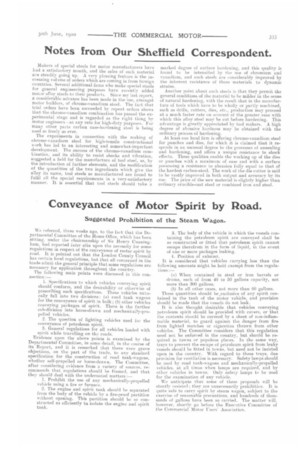Notes from Our Sheffield Correspondent.
Page 7

If you've noticed an error in this article please click here to report it so we can fix it.
Makers of special steels for motor manufacturers have had a satisfactory month, and the sales of such material are steadily going up. A very pleasing feature is the increasing volume of orders which are coming in from foreign countries. Several additional firms who make special steels for general engineering purposes have recently added motor alloy steels to their products. Since in last report, a considerable advance has been made in the use, amongst motor builders, of chrome-vanadium steel. The fact that trial orders have been succeeded by repeat orders shows that the chrome-vanadium combination has passed the experimental stage and is regarded as the right thing by motor engineers—at any rate for high-duty purposes. For ninny other parts carbon case-hardening steel is being used as freely as ever.
The experiments in connection with the making of chrome-vanadium steel for high-tensile constructional work has led to an interesting and somewhat-important development. The success of the chrome-vanadium combination, and its ability to resist shocks and vibration, suggested a field for the manufacture of tool steel, as, by the introduction of further elements, and the modification of the quantities of the two ingredients which give the alloy its name, tool steels so manufactured are found to fulfil all the special requirements in a very-satisfactory manner. It is essential that tool steels should take a marked degree of surface hardening, and this quality is found to be intensified by the use of chromium and vanadium, and such steels are considerably improved by the inherent resistance of those materials to dynamic strains.
Another point about such steels is that they permit the general conditions of the material to be milder in the sense of natural hardening, with the result that in the manufacture of tools which have to be %%holly or partly machined, such as drills, cutters, dies, etc., production may proceed at a much faster rate on account of the greater ease with which this alloy steel may be cut before hardening. This advantage is greatly appreciated by tool makers. A high degree of abrasive hardness may be obtained with the ordinary process of hardening.
At least one local firm is offering chrome-vanadium steel for punches and dies, for which it is claimed that it responds in an unusual degree to the proce,sses of annealing and hardening, and offers a unique resistance to shock effects. These qualities enable the working up of the dies or punches with a maximum of ease and with a surface possessing a resistance to abrasion fully equal to that of the hardest carbon-steel. The work of the die cutter is said to be vastly improved in both output. and accuracy by its use. The price of the new material is slightly higher than ordinary crucible-east steel or combined iron and steel.






















